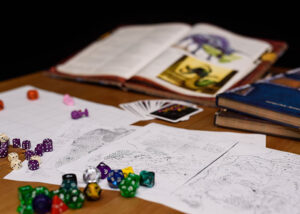What are RPGs?
Role-Playing Games (RPGs) have been around for over 50 years. In essence, they are games in which each player takes on the role of a character. The group of players then work together to tell a story with their characters. Many RPGs also include a Game Master (GM) or Dungeon Master (DM). This is a person who serves as the narrator, moves the story along, and plays all other characters including the monsters and villains. There are many different systems that have their own set of rules. One of the most recognized systems is Dungeons and Dragons.
Due to the potential for fighting and violence, RPGs can be controversial regarding their psychological effect on children. However, research has not been able to show any causal relationship between RPGs and poor mental health or delinquency. We will keep you posted as this research continues. The past decade, however, has started to produce research that shows several positive effects of playing RPGs both in and outside of therapy.
Role-Playing Games as Group Therapy
The most common way that RPGs are used therapeutically is through group therapy. Therapists who facilitate therapeutic RPG groups believe that there is an inherent opportunity in games to allow for skill building and positive social interaction. Skills that are gained can include emotional regulation, frustration tolerance, decision making, and cooperation. The therapist oftentimes takes on the role of the GM, guiding the players into situations that naturally allow them to interact socially and practice different skills.
The therapist also works to ensure safety for all players. The use of safety tools is an important part of therapeutic gaming. Common safety tools include lines, veils, and the X card. Lines are subjects that the player does not want included in the game. For example, racism is oftentimes a line that will not be a part of the game. Veils are subjects that the player doesn’t want included in detail, but can be mentioned or a part of a character’s backstory. For example, a player might not be comfortable with in depth descriptions of head injuries. This means that a character can have a head injury occur, but it will not be described in detail.
The therapist will ask each player if they have any lines or veils before the game starts, but they are free to add them throughout game play as needed. Players do not need to explain their lines and veils in front of the group, although many process these topics with their individual therapist outside of the game play setting.
Can role-playing games really help boost mental health?
The short answer is yes! Here are some of the ways in which RPGs can have a positive impact on mental health:
- Screen time alternatives- You may have seen the acronym TTRPG. This stands for Table-Top Role Playing Games. TTRPGs allow for interactive game play that doesn’t include staring at a screen!
- Character distance- When creating a character, people oftentimes put parts of themselves into their character. Even when this is consciously done, it can feel easier to work through these issues and characteristics when we aren’t talking about our real life situations. We can “talk about it” without directly talking about it.
- Connecting with peers- RPGs can be fun to play with friends AND family! For people who have difficulty making friends, a therapeutic RPG group can give them a safe space to build friendships.
- Connecting with family- RPGs can also be played as a family, allowing family members to interact in a fun space with less pressure. Many RPGs can be played online, which has been especially important during the pandemic. Online RPGs can also allow people to play with loved ones who they can’t be with in person.
- Skill building- The skills that can be obtained through playing RPGs are endless! They can include educational skills such as practice in reading or math. They can also include skills in creativity, flexible thinking, social skills, emotional regulation, frustration tolerance, and more.
Where can I find more information?
Non-profit organizations such as The Bodhana Group and Game to Grow have put an extensive amount of time into developing therapeutic gaming techniques and collecting research that has studied the connection between RPGs and mental health. Other organizations like Geek Therapy and CASTT Gamers offer community and resources for therapists, spiritual directors, educators, and other professionals who are interested in the intentional and therapeutic use of RPGs. If you are interested, please check out these great resources!
What could you and your loved ones gain from gaming?
Find information about the Teen Gaming Groups that I facilitate in St. Paul, MN on the Sentier Therapy website.
Blog written by Sentier therapist, Mary Maggie Devorak, MS, LMFT.












